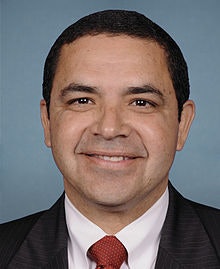Four Texas universities recently were urged by their representatives in Congress to severe ties with the Chinese government-funded Confucius Institute.
U.S. Reps. Michael McCaul, R-Austin, and Henry Cuellar, D-Laredo, sent a bipartisan letter to Texas A&M University, University of Texas at Dallas, University of Texas at San Antonio and Texas Southern University in Houston.
 Rep. Henry Cuellar
Rep. Henry Cuellar“In light of China’s subversive behavior and malicious intent to suppress our American values of free expression, speech and debate,” they wrote, “we respectfully and strongly urge you to consider terminating your Confucius Institute and other agreements with Chinese government-supported organizations.”
McCaul is chairman of the House Homeland Security Committee and Cuellar serves on the House Appropriations Committee’s Subcommittee on Homeland Security. Both publicized the letter in a statement accusing the language and cultural center of being a front for spreading Chinese propaganda.
John Sharp, chancellor of the Texas A&M University System, confirmed this week that the program is being discontinued at the main campus in Bryan-College Station and at Prairie View A&M University, a historically Black college located near Houston.
“We have great respect for Congressmen McCaul and Cuellar,” Sharp said in a statement. “I don’t question their judgment, nor their patriotism. In addition, they have access to classified information we do not have. We are terminating the contract as they suggested.”
Texas A&M’s five-year contract with the Confucius Institute was already set to end in June and will not be renewed, said Laylan Copelin, spokesman for the Texas A&M University System. He said the university was given $125,000 for participating in the program.
 Rep. Michel McCaul
Rep. Michel McCaul“The Confucius Institute at Texas A&M is very small,” Copelin told the Austin American-Statesman newspaper last week. “They don’t teach courses, and they don’t have access to classified research. They mostly bring in visiting scholars to increase cultural awareness.”
Copelin also said the university was recently one of two Defense Department contractors – and the only academic institution – to win the 2017 Defense Security Service Award for Excellence in Counterintelligence.
At the University of Texas at Dallas, the Confucius Institute started in 2007, according to the university’s website. A decision on whether to end it had not been announced as of Wednesday.
“The university has received a letter expressing concerns about the Confucius Institute from U.S. Representatives McCaul and Cuellar. We are currently reviewing all issues related to the Confucius Institute,” said John Walls, vice president of communications at the University of Texas at Dallas.
Spokespersons for TSU and the University of Texas at San Antonio could not be reached for comment.
The FBI has been investigating the 100 Confucius Institutes at American colleges around the country, along with other K-12 Confucius Classrooms. Accusations include encouraging the organization of Chinese Communist student groups that challenge human rights activists, the congressmen said.
According to published reports, Sen. Marco Rubio, R-Fla., also wrote to five schools in his state – Miami-Dade College, University of North Florida, University of South Florida, University of West Florida and Cypress Bay High School – urging severance from the Chinese institutes.
The University of West Florida announced plans in February to end its Confucius Institute while the University of Texas at Austin rejected a proposal in January from the China United States Exchange Foundation, according to the letter written by McCaul and Cuellar to the Texas universities.
Sen. Ted Cruz, R-Texas, had written a letter to UT-Austin’s president Dr. Greg Fenves, urging him to reject funds from a Hong Kong-based foundation for a new China Public Policy Center. By the time Fenves received Cruz’s letter, he had already decided not to accept the funds.
In 2014, both the University of Chicago and Pennsylvania State University ended their relationships with Confucius Institutes. According to the McCaul and Cuellar letter: “Other leading international universities have also ended their relationships with the institutes, including Japan’s Osaka Sangyo University, Canada’s McMaster University and Universite de Sherbrooke, France’s University of Lyon, Germany’s Stuttgart Media University and University of Hohenheim, and Sweden’s Stockholm University.”
In February, FBI Director Christopher Wray told a U.S. Senate hearing that his agency has been watching the Confucius Institutes for a while. He warned that Beijing is using Chinese students and others to spy and was quoted in a recent Washington Times newspaper story about the concern being widespread.
“I would just say that the use of nontraditional [information] collectors, especially in the academic setting, whether it’s professors, scientists, students, we see in almost every field office that the FBI has across the country,” he said. “It’s not just in major cities; it’s in small ones, as well. It’s across basically every discipline.”





















